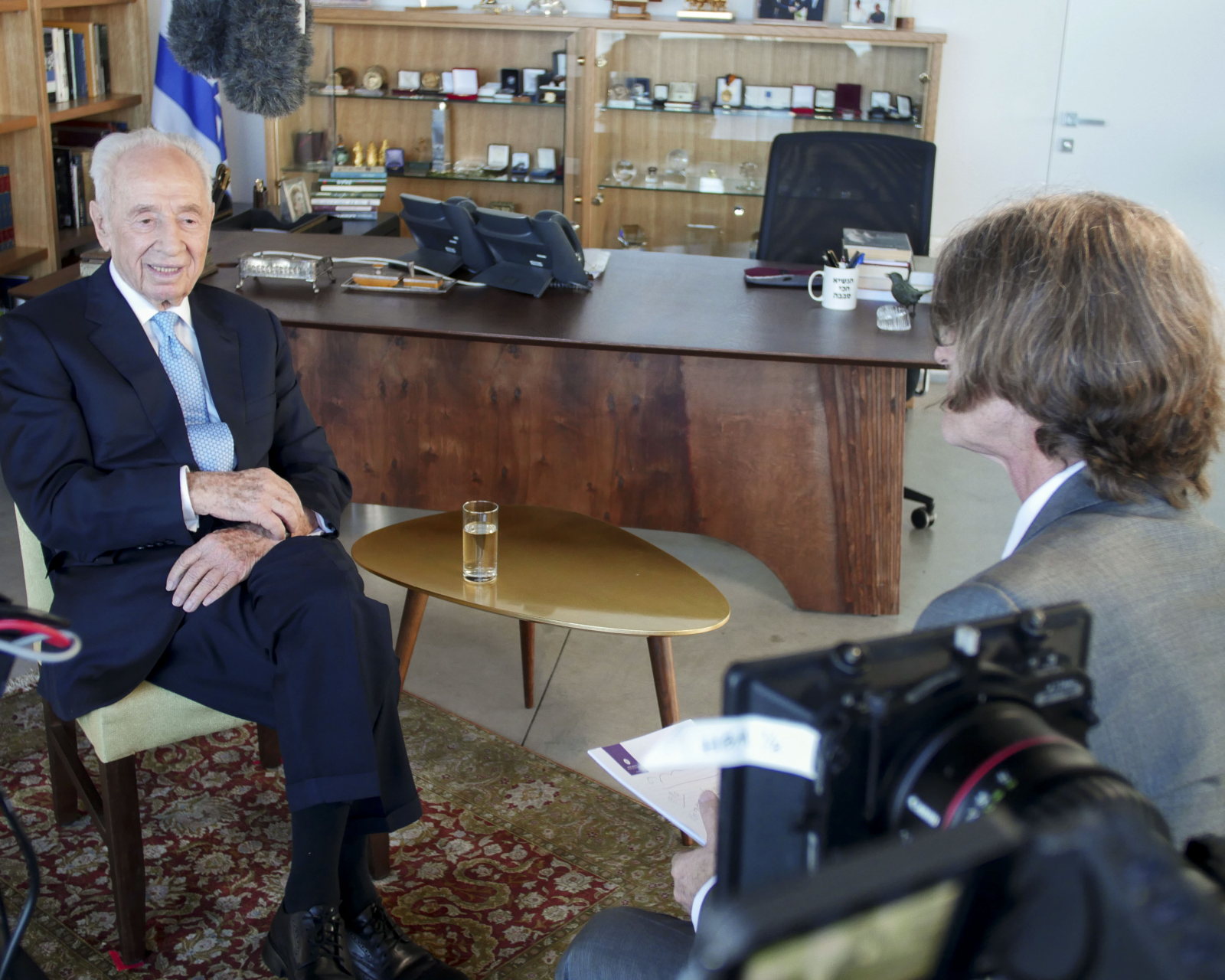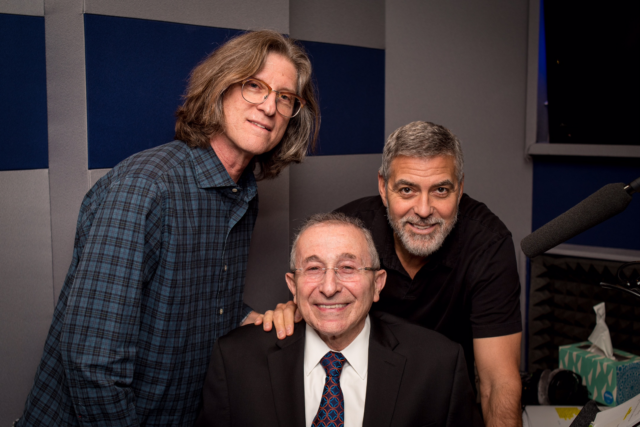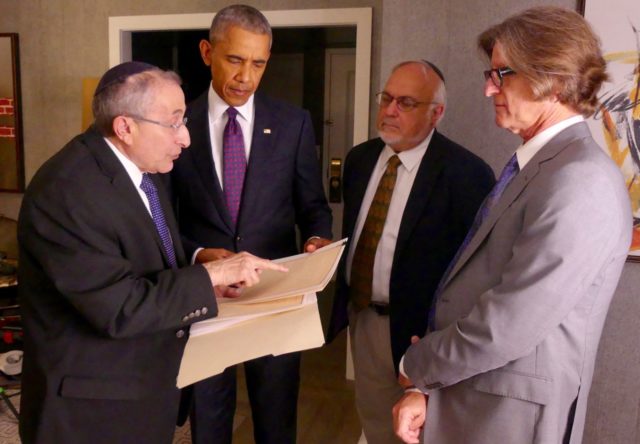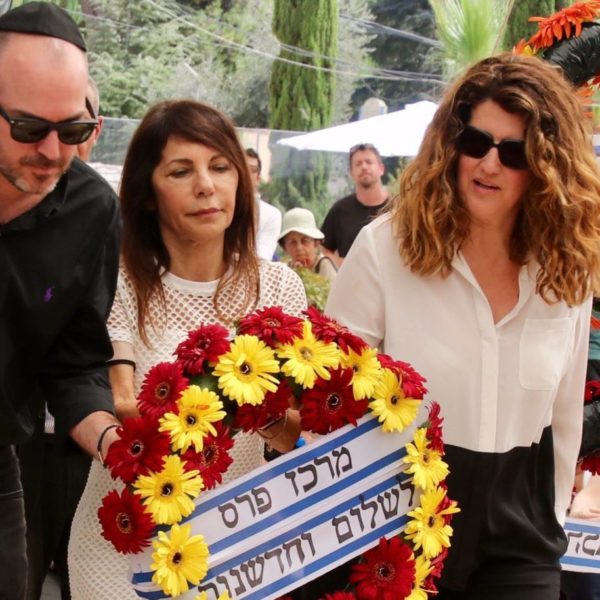By Tsipi Inberg Ben-Haim
As I was watching the film, Never stop dreaming: The life and legacy of Shimon Peres, I couldn’t help but be amazed by how much his life was parallel to the life and history of the state of Israel! Well, Shimon Peres was a few years older… But, they both endured drastic ups and downs, exciting events and very painful ones, moments in history that experienced hopes of a huge change about to happen only to be terribly disappointed a few hours later…
Will you offer us a hand? Every gift, regardless of size, fuels our future.
Your critical contribution enables us to maintain our independence from shareholders or wealthy owners, allowing us to keep up reporting without bias. It means we can continue to make Jewish Business News available to everyone.
You can support us for as little as $1 via PayPal at office@jewishbusinessnews.com.
Thank you.
All sweet mixed with sour and yet he’s back on his feet and his head up in the sky again, continues to dream with a style all his own and moreover has the courage to encourage others to NEVER STOP DREAMING!
In a star-studded event organized by the Simon Wiesenthal Center, a small but diverse group of people were invited to attend a private Congressional Screening. Before the actual screening, narrated by the actor George Clooney, (everyone looked forward to being photographed with him), there was an Israeli wine reception and planned remarks by important people in the American government. The list included :
CHUCK E. SCHUMER, Senate Minority Leader; NANCY PELOSI, House Minority Leader; KEVIN MCCARTHY, House Majority Leader Chairman; NORMAN BROWNSTEIN, Chairman Brownstein Hyatt Farber Schreck; HOWARD E. FRIEDMAN, Founding Chairman Lanx Management, LLC Co-Chairman; DAWN ARNALL Co-Chairman, SWC Board of Trustees; LARRY A. MIZEL
Chairman, SWC Board of Trustees and Special Guest Chemi Peres.
We are remembering Prime Minister and President Simon Peres, the Nobel Peace Prize Laureate, in these turbulent times, in the second year anniversary of his passing away.
I sat down for an interview with the man who followed him to Israel, Belarus and the USA to create this captivating film. The Oscar-winning Richard Trank, Writer/Director & Executive Producer of Moriah Films.
T: Did Shimon Peres see this film or part of it?
R: No, I’ll tell you what happened – we have interviewed President Simon Peres a number of times over the years. I think the first time I interviewed him was some time in the early 1990s, and over the years, we interviewed him for various of our films. One of them was our film about Theodor Herzl and we came to him to do an interview for a film we were starting to make about David Ben-Gurion, so as we were…, you know, setting the cameras up, tweaking lights, and that kind of a thing. His staff people asked, “Why aren’t you doing a film about Shimon Peres?”
T: Who was it? Yona Bar Tal?
R: Well, Yona and Ayelet both were there with us, at the time. So the subject came up, you make so many films, why have you never wanted to make a film about President Peres? And I said, “Well, that’s actually not true.” About five years ago, we were interviewing him for our film about Theodore Herzl and President Simon Peres was still president. I said to him, “Mr. President, you don’t have to make a decision today or next week or next month, but at some point in time, I would love to be the one to make a film about your life.”
In his very typical, modest way he came back with the answer, “Oh, who would want to see such a film?”
When we told Ayelet & Yona that this was his response, the ladies said, “You should have asked us…” My boss and co-producer of this film, Rabbi Marvin Hier was there with me and he said that it would be the greatest honor for us to do something like that. So we ended up staying a little bit longer in Israel and worked out a working agreement, and about a month later I was back just starting to do the first of what ended up being over 50 hours of interviews that we did from February 2016 until July of 2016.
I filmed one of the very last international appearances that he did, which was in Toronto in May. And then we were having discussions- he was getting ready to go to China to do a lecture tour, and so, we were talking about my coming and filming that, shadowing him… And about a week and a half later, he had the stroke which took his life. I felt terrible …
T: Did you stay with the same plan?
R: In the beginning, the idea was that we’ll be doing a film that was gonna be about this vibrant 93-year-old man traveling the world and having an impact all around him…
After his death we had to kind of change course and start working on a film that was about his life and legacy. One of the biggest, regrets for me was that he wasn’t there to see what we did. My dream was that he would be sitting there watching the film that we did.
T: Yeah, he would have loved it…
R: We were going after George Clooney to narrate. We didn’t have a complete “Yes” yet from George Clooney but when I told him about Clooney, ’cause he was asking, he was very interested in the whole process. He would always ask me questions like, “Well how long would a film such as this be?” He always called it a film such as this. Who would be the narrator of a film such as this? I said, “Well, Mr. President I thought it should be George Clooney. I think he’s got a wonderful voice and he brings a great audience.” He said, “Oh I like that idea. I like George Clooney. I met him, but you know, I like his wife even better!” So he knew that was our goal and kind of had a good idea of where we can try to show it. It was gonna be at the theaters, where young people would see it. But I feel like he’s with me… every time I look at the movie… but it’s sad that he couldn’t have been here to see it.
T: It’s a visually artistic movie. Sometimes documentaries are so dry, that it’s like reading a newspaper and you want to put it away. But you had, visually, very good movement from one chapter to the other, back and forth….
R: That’s what we always do… this film was our sixteen movie and our films won two Academy Awards… This is our philosophy…A lot of people used to think that…well, you see a documentary, because it’s good for you, it’s like, you know, eat your vegetables, they’re good for you…
T: You mean mostly informative…
R: Yes, but we want to entertain people. To take the view that the production value, the story telling is all the same as when you’re doing the feature film.
T: Yeah, absolutely. You know beige food is very hard to swallow, but if the same food is colorful, it’s much nicer to eat, and it’s healthy, too.
So were you an artist, a painter or wanted to be a painter or a draftsman? Where is that artistic painterly quality coming from?
R: Well, I started out as a writer. I’ve always been a writer and I guess I think visually… The term painting, drawing, it’s interesting. Both my kids are incredible artists.
I’m not. But I always loved photos and movies. For 25 years I’ve been working with one particular cinematographer, his name is Jeffrey Victor. Just as much as I am in terms of how we approach looking at things. Also, I love archival film, archival photos. And from the time I was a little kid, I could just get lost looking at old pictures of things or an old movie. So I have always been interested in what I do. Start on a place in present day and then go back in time to try match it. I look at a lot of my movies, you will see a lot of that kind of thing…
T: Did you watch old movies with President Peres in them?
R: Yes, we went to visit his childhood hometown- Vishneva and I had seen some pictures on the internet. I have a general idea of what Eastern Europe is like but I didn’t know what it would look like, and I was kind of taken by the clouds and the fields and the river. So once you’re kind of given that kind of palette, you just take off from there…
T: Right. Did you see, by the way, the film on Gauguin?
R: Yeah, sure.
T: It was a disappointment, a big failure, in my eyes. When you think about Gauguin in Haiti… the first thing that comes to mind are the vibrant colors, incredible views, luscious events…instead it was mostly grey and hardly painterly views.
So it’s very important that the director and the cinematographer will be connected to the subject, not just in front of the camera, but behind the camera. Sort of to see behind his eyes because you need to bring out his soul or the most important part of that being. So how did you manage to do that?
R: Well you know, over the years, interviewing President Peres… and reading about him, getting to know him….I was very much in awe of him, especially when he became President, I saw how he transformed -what was an office that was just kind of ceremonial, an after-thought. And he just became this incredible symbol of hope around the world, and just the best example for Israel.
So being given an opportunity like this to make the film about his life – I took this very, very seriously. I immersed myself in everything that I could, and my cinematographer is a close personal friend as well. He also began reading and we talked about it, we talked about how would we shoot the interviews and how would we do this and how would we do that. Also, talking to members of his staff, and getting to know his family including his son and granddaughter, for me became extremely important. This film of all the films that I’ve done, became like my favorite child and I think it will always be that. When he passed away, I think he was 93 years old, but he was such an unbelievable young spirit with great energy…
T: Yeah, absolutely right…
R: His stamina and his memory, was of a much younger man than a 93-year-old man – so when it happened… ten days or so that he was in the hospital, I was convinced that he’ll survive…
Unfortunately he didn’t survive… It hit me; I felt it was like when my own father died a few years ago. So we really immersed ourselves in everything about him and kind of went all over Israel, to the places that he helped to build or he was at and going to his hometown. He was really intrigued by us asking to go to where he was born, “Why would we go there?” he asked …
Part of it was for me knowing how I’d use it at the beginning of the movie but also to just help me feel closer to him…
T: Where?
R: Vishnyeva, Belarus. He was born there and lived till he was 12 years old.
T: This is also the place where his grandfather, together with many Jewish people, were burned in their temple?
R: Yes, an incredibly painful time that we recalled when visiting Vishnyeva
T: You also spend time in the movie on his relationships with Ben-Gurion….
R: Well, he was staying part of the time in the south of Israel because of his mentor David Ben-Gurion, they were very close and worked together….Peres was responsible more than anybody else for building the University in Beer Sheva, to what it is today….
But he was a Tel Aviv person…
T: What was something that surprised you about him?
R: What really shocked me was how little formal education he had for somebody who’s so worldly. I mean this man spoke several languages. His breadth of knowledge about things from literature to poetry to science and technology. That astounded me, I mean… you hear about people being called a Renaissance Man. He was a true Renaissance man. The fact that this is a guy who never graduated from high school and he was so self-taught – he taught himself English. He went to France and created a relationship between Israel and France in the ‘50s and never knew a word of French until he stayed there for a while! One of my favorite memories of him was in May of 2016 when he was at the Peres Center speaking to a group of Israeli and Palestinian kids who were doing a joint program at the Peres Center together. He was holding up a smartphone and asking them, “Do you know the difference between taking a selfie and being selfish?” Here was this 92-year-old man, talking about something that people in their sixties aren’t so well-versed about. His ability to just walk into a situation, get the gist of it, and be able to talk about it is absolutely amazing.
T: Anything that shocked you to realize about him or about the way people treated him?
R: A few times I asked him about it. I never understood how he was able to recover from events that for most people would just defeat them forever, like losing the Prime Ministership. And then coming back and being this vocal spokesman for the opposition. How he managed to come back after Rabin’s assassination. And each time he picked himself up and managed to just overcome these difficulties. He would just always end up back on top somehow and not allow himself to become bitter or angry or vindictive. I asked him, “How are you able to do that?”
I just think it was his nature and I think he had tremendous confidence in who he was, and he knew who he was, he wasn’t apologetic about who he was but he was also somebody, I think, who could adapt to situations… And that’s what happened with the Oslo agreement, because nobody as they were starting that process- nobody had any hope that there could be any kind of reconciliation or any kind of peace with the Palestinians. He saw all those old formulas that didn’t work, he threw them out the window, and started something new and even with that process began to fail, he’d pick up ways in which to save as much of it as he could. And it was his optimism and creative thinking…
Anybody who doubts that optimism can be a useful thing needs to study Peres’s life. The difference between being a fantasy land or just as he used to say, “Optimists and pessimists both die but they lead completely different lives.”
T: That’s right, it’s better to be an optimist than to go with the alternative. In fact, he helped me to create CITYarts mosaic Peace Wall. It’s just across from the Peres Peace Center.
So I remember Peres was so grateful for that. He was so happy to see that Arab and Jewish youth work together creating the mosaic. He was glad to see that some people, in spite of everything that goes on, believe that we can live in peace together. He was always very grateful.
T: People around the world believed in his ability to bring peace between the Jewish people and the Palestinians. They thought of him as the number one leader of the world. And in Israel?
R: Yes, people in Israel treated him differently….
T: Why do you think…Throughout your talks that you had with him, throughout the archives that you saw, throughout the ups and downs, why do you think it was like that? From your point of view as a filmmaker?
R: Well, look, I’m not an Israeli and certain things I can’t explain. I think that many Israelis didn’t realize what a gift they had until much later. It came out when he was a President because I don’t think any President of Israel, was ever loved as much and respected as much as Shimon Peres. When he passed away, the reaction in the country reflected that. I think that oftentimes people don’t realize or don’t honor something when they have it, and afterward, they realize what they lost. That was part of the thing with Shimon Peres…It was that some people thought he was too ambitious, too political or too optimistic etc. It’s interesting to me that he didn’t get the kind of respect that I felt he deserved. The amazing thing was, that he soldiered on- he didn’t let that affect him or deter him from his vision, his goals. The fact that he had so many different kinds of close friends from all of the different political spectrums – from Ariel Sharon to Amos Oz the writer.
I mean, what struck me last year when I was there for the one year anniversary of his passing at the Peres Center, and I remember being in the big lobby and to my left –was Sheldon and Miriam Adelson and no more than five feet away was Amos Oz. How many people can you say can have people like that there who supported you and admired you but belong in two opposing sides of the political spectrum? I found that interesting and amazing…
T: Who did you work with mainly to obtain your information?
R: I worked closely with the staff of the Peres Center. We talked about who would be in the film and the main voice needed to be Shimon Peres. Then after that, representatives of the family, and then we were lucky enough to get the various former presidents like Bill Clinton and Obama or celebrities like Barbara Streisand. But the main voice to know in the movie was Shimon Peres.
T: Is there a specific part in the movie that you really, really loved doing, and it’s close to your heart?
R: Well, one of my favorite parts is the part from when he leaves Vishnyeva in Belarus and comes to Israel and he describes his first impressions – the blue sky, how warm it is, the sun, people speaking Hebrew – I really loved that…He described it so beautifully…
T: Yeah, he was a poet. In fact, I remember in one of his interviews he said that he wanted to be a poet. He wrote poems throughout his life….
R: You know the section where he meets Sonia, I like that a lot. And then the section about his presidency and how he ends up becoming, finally, so welcomed and admired after so many years of being taken for granted.
T: Right. Was his wife still alive when you were working on the film?
R: No, she wasn’t. She passed away in 2012. I started this film in February 2016, and continued the interviews with him and all the stuff until the end of his life. And then we continued through 2017.
T: Please tell me, what is it that you would like people to remember about your film or what is important for people to take away after seeing your film?
R: I would like them to walk away with this film admiring Shimon Peres’ vision, his love of Israel, his Zionism. I want people to be inspired to dream, which is what he wanted everybody to do. Don’t be afraid to dream and don’t be afraid to dream big.
T: That’s what his son Chemi Peres always says. Was there any special interaction you had with Chemi, who continues his father’s work at the Peres Center, that you wanted us to know about?
R: For me, it was the greatest honor to get to know Chemi and spend time with him and then later on to be able to meet his wife and their kids. He is just a lovely, lovely man. I met Shimon Peres’s daughter and his son Yoni, is kind of a quiet person. They’re all amazing, in their own way. And a tribute to both Sonia and Shimon. The fact that these three people all doing constructive wonderful things, not like some other celebrity families, is very special… but Chemi is the one I’ve gotten to know the most. Every father should be as fortunate to have a son like Chemi who honors his father in every way possible.
T: Yes, in fact, Chemi is the Chairman of the Peres Center of Peace and Innovation. On October 25th he’s opening Israel’s Innovation Summit at the Peres Peace Center. You probably received the invitation?
R: Yes, I’ll be there. We’re planning to show the film during the summit.
T: It looks like Chemi is turning his father’s dreams into a reality, one step at a time….
Can you give me an idea when “NEVER STOP DREAMING” will be in the theaters?
R: So we’re working on it now. We’re showing it in film festivals first, throughout the fall and winter. This time next year it’ll probably be in the theaters everywhere.








